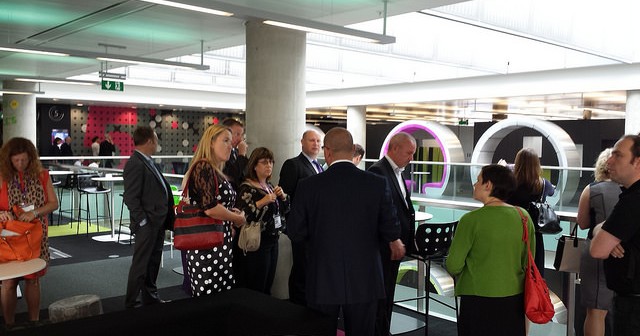BIFM North Event – Shifting Sands

New ways of working, communicating and dealing with suppliers was the topic for the most recent BIFM North region event held, appropriately, at BBC MediaCity in Salford, one of the most forward-thinking workplaces in the UK.
More than 40 delegates packed into the Alan Turing Imaginarium to be welcomed by North region committee member Lee Murfitt, the event chair, and a keen social media participant (@lmrftt). He was quick to start tweeting about the first speaker – Katie King, managing director of social media agency Zoodikers Consulting, who talked about how FMs can avoid extinction by evolving into social businesses.
“Think twice before you give social media to the intern,” she said. “It’s a tool for people who really understand and lead business strategy. All the different business functions need to understand what social media can do – HR, internal comms, sales people, the board.” Social media is about identifying where your target audience is, whether that be existing clients, new clients, or people you want to hire, finding out where they are talking about and then joining in, she said. King’s four-step approach involves planning, listening, analysing and then engaging.
Despite delegates enjoying visiting one of the UK’s most envied workplaces, the next speaker – Andrew Mawson, managing director of Advanced Workplace Associates – dismissed the preeminence of the role of offices in the concept of the 21st century workplace. “A workplace is wherever you work, it’s not a building, and the 21st century workplace is not just one workplace, but many – home, cafes, client sites, on the move.” He argued convincingly that people’s energy make an organisation a success: “Organisations are large communities of humans strung together by technology.”
Therefore the role of the facilities manager should help those people be the best that they can be, Mawson said. “FMs spend too much time focusing on cost – reducing a cleaning contract by 10 per cent – and not enough time focusing on people. And FM should be responsible for helping each person to have their very best day at work, to give them the different spaces they need to create, communicate, collaborate or think.”
But facilities professionals also face a number of challenges in their daily lives and the last two speakers of the morning discussed two of those: managing the information from a large supply base and negotiating terms with those suppliers in the first place.
Tim Hoiles, chief operations officer at Trade Interchange, outlined the challenges of managing supplier information: risk to brand – from insurance to H&S certification and environmental accreditation, it’s crucial to know that your suppliers are fully compliant; Lack of visibility – with a large number of suppliers it can be difficult to know the current status of each; information silos – there may be multiple versions of the truth, with different parts of the organisation gathering information for their own needs; Administration – can be a burden simply through the sheer quantity of documentation. One organisation that is facing these issues head-on is Sodexo which, with Trade Interchange, is implementing a global supplier information management system to manage data about their supply chain partners.
FM service provider Servest’s head of procurement, Stuart Wright then took to the podium to share his experience of negotiating with suppliers to help the FMs in the audience to get the best deal. He explained that there are five key stages: planning, opening, testing, reaching a deal and summarising. Wright explained the importance of knowing your area, understanding both your objectives and those of your supplier, your targets and what you are prepared to “trade” to achieve them.
He also spoke around the importance of establishing an agenda, setting timeframes and maintaining control of the meeting. Wright highlighted the benefits of asking open questions, not taking positions on things that aren’t important, making controlled concessions, making sure of a shared understanding and agreement and never gloating. “The other person must feel that they got the best deal available.”
Delegates then enjoyed a behind-the-scenes tour, and celeb-spotting, at Quay House, the BBC’s 135,000 sq ft building from where BBC Breakfast, Match of the Day, BBC Radio 5 Live, North West Tonight and BBC Radio Manchester are broadcast; and Dock House, which contains the BBC’s Research and Development and Religion and Ethics departments, BBC Radio 6 Music and some Radio 4 programmes.
Source: Cathy Hayward, Magenta Associates